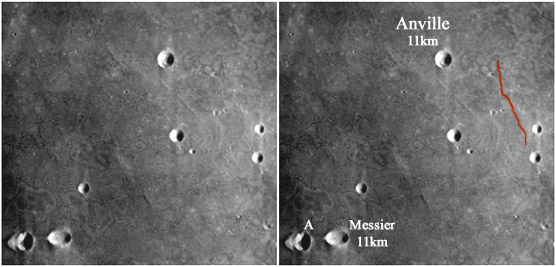Dorsum Cayeux
Contents
Dorsum Cayeux
|
Lat: 1.6°N, Long: 51.2°E, Length: 84 km, Height: km, Rükl: 37 |
Images
LPOD Photo Gallery Lunar Orbiter Images Apollo Images
- L.O.1 Frame 032 is a vertical view of Dorsum Cayeux in and near the "constellation" of the four craters Taruntius G' (Anville), Taruntius H, K, and P (in Mare Fecunditatis). Note the cluster of odd-shaped craterlets in the "constellation". Research Danny Caes.
- L.O.5 Frame 038 is an oblique view of the region between Dorsum Cayeux and the Messier-couple. Note the bright "Heiligenschein"! (Retro-Reflection). Research Danny Caes.
- AS11-37-5445 shows Apollo 11's CSM Columbia over Dorsum Cayeux (central) and the bowl-shaped craters Taruntius H (upper left), Taruntius G/ Anville (upper right), and the twins Taruntius K and P (lower left). Note the weird shaped triplet of craterlets behind the CSM. Research Danny Caes.
- AS11-40-5846 is another orbital view of the Dorsum Cayeux region (a little above and to the right of LM Eagles bell-shaped exhaust nozzles). Research Danny Caes.
- AS10-35-5204 shows the "constellation" of the four craters Taruntius G/ H /K / and P, and Dorsum Cayeux running through it. Note: one of the four nozzle clusters of Apollo 10's LM Snoopy is visible at the image's right margin. Research Danny Caes.
Maps
(LAC zone 62D4) LAC map Geologic map LM map LTO map
Description
Description: Wikipedia
Additional Information
Nomenclature
- Lucien Cayeux (March 16, 1864 - November 1, 1944) was a French sedimentary petrographer. He is noted for his study of sediments with the polarizing microscope, and was one of the pioneers in this field.
- Dorsum Cayeux runs through the four craters Taruntius G (Anville), Taruntius H, K, and P. These four craters are nicknamed The Constellation or The Constellation of Four by Danny Caes. The central part of The Constellation contains a weird shaped trio of craterlets which is an interesting target for webcam-imagers of the moon's surface. - DannyCaes Feb 24, 2008
- The name Cayeux should not be confused with Cailleux, which is a crater at the moon's Far Side!- DannyCaes Apr 26, 2009
LPOD Articles
Bibliography
